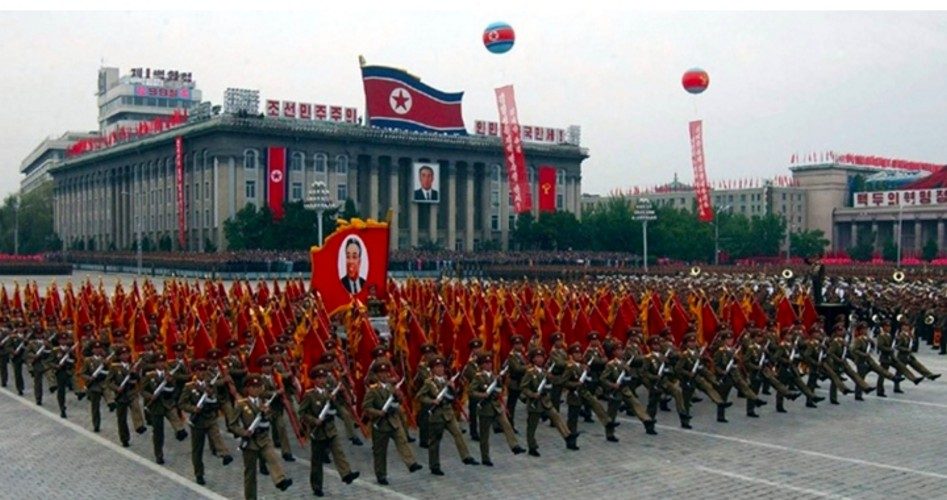
The government of North Korea has denied that it is secretly negotiating to provide arms to Hamas in its conflict with Israel. According to London’s Telegraph newspaper, the Palestinian terrorist group, working through a Lebanese middleman, has offered hundreds of thousands of dollars to North Korea to purchase missiles and communications equipment to continue its warfare with Israel’s IDF.
“Hamas is looking for ways to replenish its stocks of missiles because of the large numbers it has fired at Israel in recent weeks,” an unnamed “security official” told the Telegraph. “North Korea is an obvious place to seek supplies because Pyongyang already has close ties with a number of militant Islamist groups in the Middle East.”
Hamas reportedly has already made a significant downpayment to North Korea for the delivery of hundreds of missiles, along with communications equipment, “that will improve the ability of Hamas fighters to coordinate operations against Israeli forces,” stated the Telegraph.
But following the July 26 Telegraph report, the government in Pyongyang flatly denied that such a deal is in the works, calling the allegations “utterly baseless sophism and sheer fiction let loose by the U.S. to isolate [North Korea] internationally.” The statement added that “lurking behind this propaganda is a sinister intention of the U.S. to justify its criminal acts of backing Israel driven into a tight corner by its recent unethical killings in the Gaza Strip.”
However, past actions on the part of North Korea make its present denial suspect.
The Telegraph reported that North Korea’s ties to Hamas go back to at least 2009, “when 35 tons of arms, including surface-to-surface rockets and rocket-propelled grenades, were seized after a cargo plane carrying the equipment was forced to make an emergency landing at Bangkok airport.”
According to investigators in that case, the shipment was on its way to Iran, where the arms were then to be smuggled to Hizbollah in Lebanon and Hamas in Gaza.
The Wall Street Journal noted that arms sales have long been a lucrative revenue stream for North Korea, and “shipments have continued under the current ruler, Kim Jong Un, who took power in late 2011.” The Journal recalled that a year ago authorities in Panama “intercepted a hidden arms shipment on a North Korean ship sailing from Cuba.” Pyongyang insisted the arms were on their way back to North Korea for maintenance.
Israeli intelligence said that North Korea has also advised Hamas on the construction of its extensive tunnel system that has allowed Palestinian fighters to move weapons and manpower into position against Israeli targets unseen. The Telegraph noted that North Korea has “one of the world’s most sophisticated network of tunnels running beneath the demilitarized zone with South Korea, and Israeli commanders believe Hamas has used this expertise to improve their own tunnel network.”
A major objective of Israel’s assault on Gaza has been to destroy Hamas’ tunnel network in order to paralyze the group’s ability to wage assaults on Israel.
Thus far, using its high-tech “Iron Dome” missile defense system, Israel has been able to largely deflect the barrage of rockets that has come into the country from Gaza. However, Hamas’ has improved its offensive capabilities, beefing up its arsenal — which began with Iranian rockets having a range of less than ten miles — to include 30-mile-range 122mm Katyusha rockets, and now Syrian M0302 missiles, with the range and power to destroy targets up to 100 miles away. Israeli intelligence has estimated that Hamas may have a stockpile of 10,000 rockets and mortars at its disposal, “including long-range rockets capable of reaching Jerusalem, Tel Aviv, and the northern port city of Haifa,” reported the Telegraph.
Meanwhile, the U.S. Congress is focusing on a request from the Pentagon for the U.S. to send $225 million to Israel to service its “Iron Dome” missile defense system. On July 23 Senator Barbara Mikulski (D-Md.), chair of the Senate Appropriations Committee, forwarded an “Emergency Supplemental Funding” measure that included the $225 million for Israel, along with $615 million to fight wildfires across the U.S., and a whopping $2.73 billion “to address the crisis of children seeking refuge at our Southwestern border,” said Mikulski.
By contrast congressional Republicans were seeking a “clean” bill devoted just to funding Israel. TheHill.com reported that Senators Lindsey Graham (R-SC), Kelly Ayotte (R-NH), John Thune (R-SD) and Ted Cruz (R-Texas) joined Senate Minority Leader Mitch McConnell (R-Ky.) in supporting a measure that would send the requested funding to Israel. “We don’t need to marry it up with controversial topics,” Sen. Graham argued. “Pass war appropriations for Iron Dome because it’s the right thing to do.”
McConnell insisted that “Republicans are united in our support of Israel’s defense,” adding that they were opposed “to any effort to force a ceasefire on Israel that does not further its security objectives. Israel’s right to defend itself should be affirmed.”
McConnell was apparently referring to a proposed ceasefire agreement that Secretary of State John Kerry delivered to Israeli Prime Minister Netanyahu July 25, which, reported the Israel news site Haaretz.com, “contained practically no mention of Israel’s security needs or of demilitarizing the Gaza Strip of rockets and heavy weaponry or of the need of destroying the terror tunnels linking Gaza to Israeli territory.”
What is overlooked in the debate is that U.S. foreign aid is provided both to Israel and regimes hostile to Israel, and that foreign aid provided to Israel is used as a club to influence Israel policy. All of which demands the question: Why not end all foreign aid and stop trying to dictate Israeli policy?
Photo of Pyongyang’s Kim Il Sung Square, North Korea: AP Images



